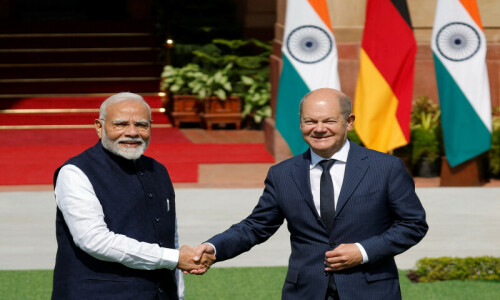TOKYO: Japan and the European Union announced a sweeping new security and defence partnership in Tokyo on Friday, which EU foreign policy chief Josep Borrell hailed as a historic and “very timely” step.
Borrell and his Japanese counterpart Takeshi Iwaya unveiled the pact to develop cooperation on joint military drills, exchange of information related to the defence industry, and space security among other matters.
“I am extremely pleased to be here with Minister Iwaya to announce the conclusion of this security and defence partnership between the European Union and Japan,” Borrell said.
He called it the “the first agreement of this nature” the EU has made with an Asia-Pacific country, describing it as “historical and very timely”.
“We live in a very dangerous world” and “given the situation in both of our regions, this political framework deepens our ability to tackle emerging threats together,” Borrell told reporters.
He did not mention China, but Japan has previously called its neighbour its greatest security challenge.
After the Tokyo talks, Borrell heads to South Korea, where concerns about North Korea will top the agenda.
The United States has said thousands of North Korean troops are in Russia readying to fight in Ukraine.
Pyongyang test-fired one of its newest and most powerful missiles on Thursday, demonstrating its threat to the US days ahead of elections.
Defence industries
The text of the EU-Japan Security and Defence Partnership said they would promote “concrete naval cooperation”, including through activities such as joint exercises and port calls, which could also include “mutually designated third countries”.
It also said the EU and Japan would discuss “the development of respective defence initiatives, including exchange of information on defence industry-related matters”.
Japan, which for decades has relied on the United States for military hardware, is also developing a new fighter jet with EU member Italy and Britain set to be airborne by 2035.
The agreement on industrial cooperation could “turbo-charge collaboration, such as joint defence projects between Japanese and European firms funded through EU mechanisms may be on the cards”, analyst Yee Kuang Heng of the University of Tokyo’s Graduate School of Public Policy said.
Japan is ramping up defence spending to the NATO standard of two percent of GDP by 2027, partly to counter China.
Japanese Prime Minister Shigeru Ishiba, who could head a minority government after a disastrous general election last week, has said that “today’s Ukraine could be tomorrow’s East Asia”.
Ishiba has also called for the creation of a NATO-like regional alliance with its tenet of collective security, although he has conceded this will “not happen overnight”.
Published in Dawn, November 2nd, 2024














































Dear visitor, the comments section is undergoing an overhaul and will return soon.